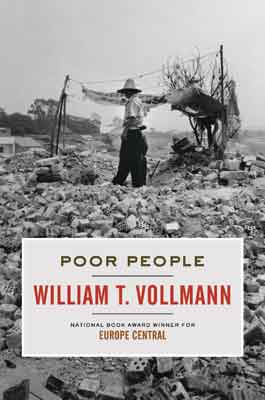
Take James Agee’s Let Us Now Praise Famous Men, throw in Tokyo prostitutes, Kazakh peasants, Chinese immigrant traffickers, and a heady brew of Karl Marx, Adam Smith, and recreational drugs, and you begin to approach William Vollmann’s Poor People.
Last year, Vollmann published Rising Up and Rising Down, a 3,300-page magnum opus that attempted to devise a moral calculus for when violence is justified. He’s up to the same sort of obsessive reasoning here, albeit at much shorter length and in a more accessible style. Vollmann travels the world, posing an earnest question: “Why are some rich and others poor?” To his credit, he realizes that this is a potentially annoying inquiry. What do you say to a Buddhist who believes that his abject state is the result of sins in a past life? How do you even know he’s “poor”?
The best reason to read the book is for the character of Vollmann himself—an utterly exposed writer, in all senses of the word. He goes where no one else wants to go (Congo, Serbia, Afghanistan) and talks to people no one else wants to approach (the starved, the deformed) with little regard for hygiene or the reporter-subject boundary (he often pays interviewees). While his adventures occasionally read like Mr. Magoo in grad school, Vollmann never strays from his intent to understand the experience of poverty.
Perhaps his most empathetic act takes place back in California, where he gets to know the homeless people who live in the parking lot next to his house. In typical fashion, he exhaustively delineates his mixed emotions about giving them charity, concluding: “I’m scared about the poor people coming to take everything from me.” It’s this mixture of admirable openness and self-punishing scrutiny that fuels this odd, questing book. Vollmann never answers why poverty exists, but he does tear down stereotypes about the poor, including the most pernicious: “They can’t be helped.”















